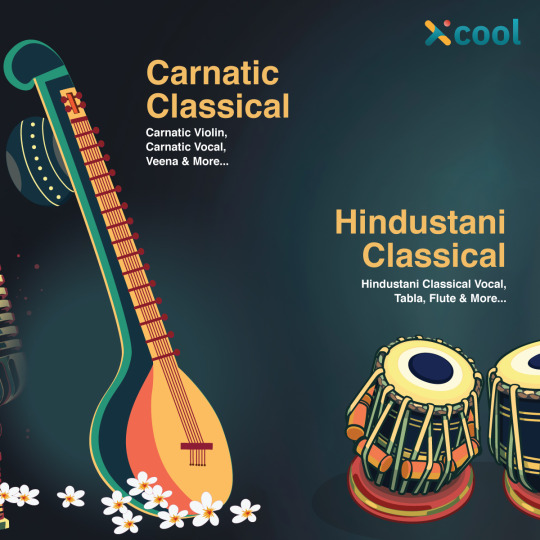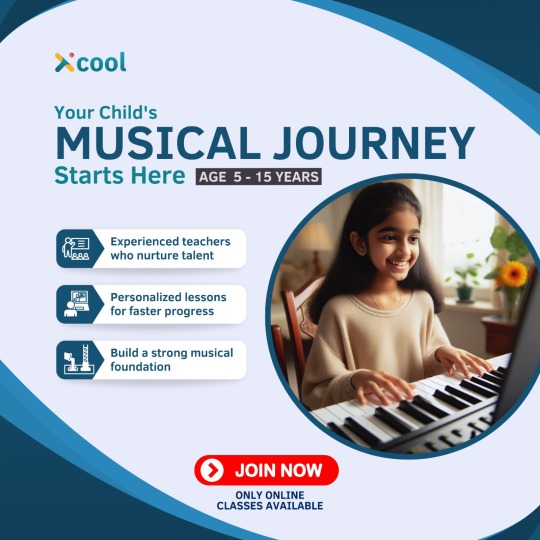Text
Can we learn electric guitar without learning the acoustic guitar?
Yes, you can learn electric guitar without first learning acoustic guitar. While acoustic and electric guitars share similarities in terms of basic techniques and music theory, they also have distinct characteristics and playing styles.
Learning electric guitar directly allows you to focus on the techniques and skills specific to that instrument, such as using amplifiers and effects pedals to shape your sound. You'll also learn techniques like bending notes, vibrato, and palm muting, which are more common in electric guitar playing.
Websites like xcool offer excellent online music classes tailored specifically for learning electric guitar. They provide structured lessons covering everything from basic chords and scales to more advanced techniques and styles. With xcool, you can access video tutorials, interactive exercises, and even have the opportunity to connect with instructors and fellow learners for guidance and support.
By starting with electric guitar lessons on platforms like xcool, you'll receive comprehensive instruction that caters directly to your interests and goals, helping you progress efficiently and confidently on your musical journey.
#classical music#guitar#online classes#online music class#vocal music#flute music#piano#music#education#violin
0 notes
Text
Best online Violin classes
Online violin classes offer a convenient and effective way for students to learn this beautiful instrument from the comfort of their own homes. Through video tutorials, live lessons, and interactive exercises, students can receive personalized guidance tailored to their skill level.
In these classes, students will learn the fundamentals of playing the violin, including proper posture, bowing technique, finger placement, and reading sheet music. With the help of experienced instructors, they can progress at their own pace and receive feedback on their playing in real-time.
Online music classes provide several benefits. First, they offer flexibility in scheduling, allowing students to fit lessons around their busy lives. Additionally, students have access to a wide range of instructional materials, including videos, audio recordings, and written exercises, which they can review as often as needed to reinforce their learning.
Moreover, online classes foster a sense of community among students, who can connect with peers from around the world through virtual forums and group sessions. This creates opportunities for collaboration and mutual support, enhancing the overall learning experience.
In conclusion, online violin classes offer a convenient, flexible, and engaging way for students to learn and master this timeless instrument, guided by experienced instructors and supported by a vibrant online community.
#classical music#online classes#online music class#flute music#vocal music#education#music#violin#guitar#piano
1 note
·
View note
Text

Best online musical instrument classes
#classical music#guitar#online classes#online music class#vocal music#flute music#piano#music#education#violin
1 note
·
View note
Text
#guitar#classical music#online music class#flute music#online classes#piano#vocal music#music#education#violin
0 notes
Text
#guitar#online classes#classical music#vocal music#flute music#piano#online music class#music#education#violin
0 notes
Text
#classical music#online classes#flute music#vocal music#music#piano#guitar#online music class#violin#education
0 notes
Text
Best Online Guitar Classes
Online guitar classes provide a fantastic opportunity for learners to master the guitar from the comfort of their homes. One of the best platforms for this is Xcool.in which offers step-by-step lessons designed for beginners and intermediate players. These classes break down guitar playing into manageable chunks, making it easy to follow along even for those new to music.
Firstly, online classes offer flexibility, allowing students to learn at their own pace. They can access lessons anytime, anywhere, fitting them into their busy schedules. Additionally, online classes often provide a variety of resources such as video tutorials, interactive exercises, and downloadable materials, enhancing the learning experience.
Moreover, online platforms usually have a vast library of songs across different genres, enabling learners to explore various styles and techniques. This diverse repertoire keeps students engaged and motivated to progress in their guitar journey.
Furthermore, online communities and forums associated with these classes facilitate interaction with fellow learners and instructors, providing valuable support and feedback.
Overall, online guitar classes offer a convenient, comprehensive, and engaging way for aspiring musicians to develop their skills and achieve their musical goals. With dedication and practice, students can unlock their potential and become proficient guitar players.
#classical music#guitar#online music class#online classes#piano#flute music#music#violin#vocal music#education
0 notes
Text
What are the best musical instruments for children to learn how to play?
Learning to play a musical instrument can be a rewarding experience for children, fostering creativity, discipline, and cognitive development. When considering which instrument is best for a child to learn, several factors should be taken into account, including the child's interests, physical abilities, and personality. Here are some instruments that are commonly recommended for children to learn:
Piano/Keyboard: The piano is often considered one of the best instruments for children to learn due to its versatility and foundational role in music theory. Keyboards are also a good option for beginners as they are more affordable and portable.
Guitar: The guitar is popular among children due to its cool factor and the wide range of musical styles it can be used for, from pop to rock to classical. There are also smaller-sized guitars designed specifically for children.
Violin: The violin is a classic choice for young musicians, teaching important skills such as ear training, coordination, and discipline. It's also available in smaller sizes to accommodate children.
Recorder: The recorder is often used as a starter instrument for young children due to its simplicity and affordability. It teaches basic music fundamentals like breath control and finger dexterity.
Drums/Percussion: Drumming is great for energetic children who love to move and make noise. It helps develop rhythm and coordination while allowing for creative expression.
Online music classes can be a valuable resource for children learning to play an instrument. Here's how they can help:
Convenience: Online classes allow children to learn from the comfort of their own home, eliminating the need for travel and fitting easily into busy schedules.
Flexibility: Many online music platforms offer flexible scheduling options, allowing children to learn at their own pace and schedule lessons around other commitments.
Access to Expert Instruction: Online classes provide access to skilled instructors from around the world, giving children the opportunity to learn from the best regardless of their location.
Interactive Learning: Online music classes often include interactive features such as live video lessons, virtual sheet music, and interactive exercises, making learning engaging and fun.
Community and Support: Online music platforms often have communities where students can interact with each other, share experiences, and receive support and encouragement from fellow musicians and instructors.
In conclusion, the best musical instrument for a child to learn depends on their interests, abilities, and personality. Online music classes offer a convenient and effective way for children to learn to play an instrument, providing expert instruction, interactive learning experiences, and a supportive community to help them succeed.

#classical music#guitar#online music class#flute music#music#piano#education#vocal music#violin#online classes
0 notes
Text

#classical music#online classes#vocal music#flute music#piano#violin#education#guitar#online music class#music
0 notes
Text
How do online music classes incorporate elements such as music theory, ear training, and performance skills into their curriculum?
Online music classes have revolutionized the way people learn about music. Whether it's mastering an instrument, understanding music theory, honing ear training, or developing performance skills, these classes offer comprehensive learning experiences right from the comfort of one's home. Let's delve into how these classes incorporate various elements into their curriculum.
Firstly, let's talk about music theory. In online music classes, students learn the fundamental principles that underpin music through interactive lessons and exercises. These classes cover topics like notation, rhythm, harmony, melody, and form. To make learning engaging, instructors often use visuals, quizzes, and games to reinforce concepts. For example, students might learn about different note durations by listening to examples and identifying them in music notation software or through interactive exercises.
Ear training is another crucial aspect. It helps students develop a keen sense of pitch, rhythm, and musical structure by training their ears to recognize and interpret musical elements. In online classes, ear training exercises include activities like identifying intervals, chords, and rhythms by ear. Students may listen to musical excerpts and then replicate them on their instruments or through vocalization. Additionally, software applications and virtual instruments allow students to practice and receive feedback on their performance.
Performance skills are also an integral part of online music classes. Students learn how to play their chosen instrument or develop their vocal abilities through guided lessons and practice routines. Instructors provide personalized feedback and guidance to help students improve their technique, expression, and overall musicianship. Video demonstrations, live sessions, and virtual recitals provide opportunities for students to showcase their progress and receive constructive criticism from instructors and peers.
Combining these elements, online music classes create a well-rounded learning experience that fosters musical growth and creativity. By incorporating interactive multimedia resources, personalized feedback, and virtual collaboration tools, these classes offer a dynamic and engaging environment for students to explore and develop their musical abilities.
In conclusion, online music classes integrate music theory, ear training, and performance skills into their curriculum through interactive lessons, exercises, and personalized feedback. By leveraging technology and innovative teaching methods, these classes provide students with comprehensive learning experiences that foster musical growth and creativity. Whether you're a beginner or an experienced musician, online music classes offer accessible and effective ways to learn, practice, and perform music from anywhere in the world.
#classical music#online classes#guitar#flute music#vocal music#violin#education#music#online music class#piano
0 notes
Text

0 notes
Text
Is piano one of the hardest instruments to learn?
Learning to play the piano can be both challenging and rewarding. While some may say it's one of the hardest instruments to learn, others may find it easier depending on their background and dedication. Let's explore why learning the piano can be difficult and how online music classes can make it easier.
Firstly, the piano requires coordination between both hands, each playing different parts simultaneously. This can be tricky for beginners, especially when they're still developing finger independence and strength. Additionally, reading music notation and understanding rhythm are essential skills for piano playing, which can take time to master.
Furthermore, the piano has a wide range of keys, requiring the player to navigate between high and low notes. This can be overwhelming for beginners, as they need to memorize the placement of each note on the keyboard. Additionally, piano music often involves complex harmonies and chords, adding another layer of difficulty.
However, online music classes can make learning the piano more accessible and enjoyable. These classes typically offer structured lessons that gradually introduce concepts and techniques, starting from the basics and progressing to more advanced topics. Video tutorials and interactive exercises can help students visualize and understand musical concepts better.
Moreover, online classes provide flexibility in scheduling, allowing students to learn at their own pace and practice whenever it's convenient for them. This flexibility is especially beneficial for students with busy schedules or those who prefer to learn at their own pace.
Online music classes also offer a wide range of resources, including virtual keyboards, practice exercises, and instructional videos. These resources can supplement traditional piano lessons and provide additional support and guidance for students.
In conclusion, while learning the piano can be challenging due to its coordination requirements, complex music notation, and wide range of keys, online music classes can make the learning process easier and more accessible. With structured lessons, interactive exercises, and flexible scheduling, students can overcome the challenges of learning the piano and progress towards becoming proficient players.
#classical music#vocal music#flute music#piano#online classes#violin#education#guitar#online music class#music
1 note
·
View note
Text

0 notes
Text
Online learning music platforms provide several ways to help learners, in acquiring new skills:
Comprehensive Curriculum: These platforms often offer structured courses covering various aspects of music theory, instrument technique, sight-reading, ear training, and more. The curriculum is designed to guide learners from basic to advanced levels, ensuring a systematic approach to skill development.
Interactive Lessons: Online platforms feature interactive lessons presented through videos, tutorials, quizzes, and exercises. These interactive elements engage learners and facilitate active participation, enhancing comprehension and retention of new concepts and skills.
Feedback and Assessment: Many online music platforms incorporate feedback mechanisms where learners can submit recordings of their performances or complete assessments to receive constructive feedback from instructors or peers. This feedback helps identify areas for improvement and offers guidance on how to enhance skills effectively.
Access to Expert Instruction: Learners have access to a diverse range of instructors and musicians from around the world, each with their unique expertise and teaching styles. This exposure allows learners to benefit from different perspectives and techniques, enriching their learning experience.
Flexibility and Convenience: Online learning music platforms offer flexibility in scheduling, allowing learners to access lessons and practice materials at their convenience. This flexibility accommodates learners' busy schedules and enables them to learn at their own pace, fostering a more personalized learning experience.
Variety of Learning Resources: These platforms provide a wide range of learning resources such as sheet music, backing tracks, play-along exercises, and supplementary materials. Learners can explore different musical genres, styles, and techniques, expanding their musical repertoire and honing their skills in various areas.
Community and Collaboration: Many online music platforms foster a sense of community among learners through forums, discussion boards, and virtual events. This collaborative environment encourages learners to share experiences, seek advice, and collaborate on musical projects, fostering a supportive learning community.
Overall, online learning music platforms offer a versatile and effective way for all age group and learners of all levels to acquire new music skills. With their comprehensive curriculum, interactive lessons, expert instruction, flexibility, and collaborative features, these platforms provide valuable opportunities for skill development and musical growth.
#guitar#music#online classes#online music class#piano#classical music#flute music#education#vocal music
0 notes